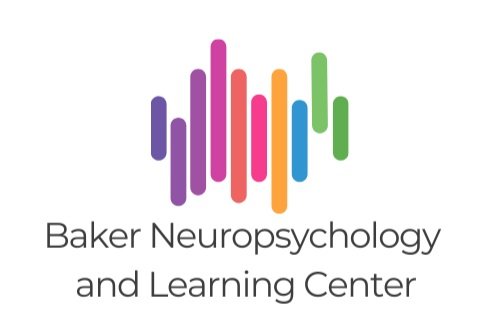Frequently Asked Questions
FAQs About Neuropsychology
-
Neuropsychology is a specialty field within psychology, dedicated to understanding the relationships between brain and behavior. A neuropsychological evaluation examines an individual’s cognition, learning, emotion and behavior and how it relates to brain functioning. A neuropsychologist is a clinical psychologist with extensive training in neuropsychology (e.g., neuropsychological internship, two year neuropsychology post-doctoral fellowship).
-
Unlike school-based or psycho-educational evaluations, a neuropsychological evaluation at BNLC is administered by a highly trained, board certified neuropsychologist. Neuropsychological evaluations offer a more comprehensive assessment, answer complex diagnostic questions, as well as provide tailored treatment recommendations.
-
• Dr. Baker is board certified in clinical neuropsychology and has over a decade of experience working with a variety of medical and non-medical diagnoses.
• As a former teacher, Dr. Baker has a unique understanding of schools, curriculum and the classroom setting.
• Dr. Baker is known for his warm and personable approach to children and families.
• Dr. Baker will advocate for your child through ongoing consultation with your child’s school and treatment team including attending 504 or IEP meetings.
• Evaluations are completed in a single day so your child will not miss multiple days of school.
• Results will be provided during an in-person or virtual feedback session within 1-2 weeks. A comprehensive written report will be sent after the feedback, including specific recommendations for school, home and therapy.
-
Areas commonly assessed as part of a neuropsychological evaluation include:
• Intellectual functioning or IQ
• Visual-spatial and visual motor
• Language and communication
• Learning and memory
• Processing speed and attention
• Executive functioning
• Mood, personality, and social skills
• Academic skills (e.g., reading, math, writing)
-
Some common reasons for referral are:
• They are struggling with learning to read, write or do math.
• They are not responding to tutoring or interventions.
• They are performing below grade level.
• They are struggling with consistent focus and concentration.
• Homework time is stressful and challenging.
• They have extreme anxiety around school or learning.
• Teachers have voiced concern about your child’s behavior or attention at school.
• They are noticeably disorganized, scattered, and struggle with multi-tasking.
-
Dr. Baker provides a no-cost initial conversation to determine the scope of services and will discuss expected cost.
Cost will ultimately depend on the complexity of the case and the time required to complete the evaluation. Most comprehensive neuropsychological evaluations range from $2000-$3500.
For less complicated evaluations (e.g., only IQ assessment, focused ADHD evaluation, etc.) cost can range from $1000-$2000.
A clear understanding of cost will be discussed during the initial conversation and can vary depending on complexity and involvement required for the case.
Of note: At this time BNLC does not take insurance but can provide a detailed invoice (super bill) if you wish to apply for (out-of-network) reimbursement.
Check, credit/debit card, and FSA/HSA cards are acceptable forms of payment.
Payment is often broken into two chunks-one portion due after the day of testing and a final portion due once the feedback discussion has occurred and the report is finalized. Dr. Baker will send the final report once the final invoice has been paid.
-
• Please gather and bring any information that has been provided to you by teachers or other professionals relevant to your concerns.
• Please bring any prior evaluations or standardized assessment results such as statewide or national testing (e.g., CMAS, PSAT, SAT, ACT, etc.).
• Fill out and bring with you the forms located in the Forms section.
• You may bring a water bottle and a snack for your child.
-
For younger children, it is often helpful to explain first and foremost that there will absolutely be no needles, shots or “ouchies.” Your child will be playing various “brain games,” writing, building, drawing activities, as well as showing all the wonderful things they have learned at school. This is just as much a strengths-based evaluation, as it is one that looks at weaknesses.
For older children, teens, and young adults, it might be more appropriate to describe the true reason for the testing (e.g., to look at how you learn best, to see your strengths and weaknesses, or even to see if there are any learning or attention diagnoses that have been missed).
Regardless of age, it is important to stress that they take this evaluation seriously and give their best effort.
Most of the children/adolescents that Dr. Baker evaluates truly enjoy the process and find some of the “brain games” to be interesting, fun, and engaging.
-
Most evaluations begin at 9 or 9:30am. There will be an initial “meet and greet” period in which Dr. Baker will sit down with you and your child to discuss the day, reasons for the evaluation, and the goals of the evaluation. Once everyone feels comfortable, Dr. Baker will begin his assessment, which is conducted one-on-one with your child. Parents often will have various questionnaires to complete, which they can do in our waiting room, small office near the waiting room, or in the cafe on the ground floor of the building.
Note: Parents are not expected to stay the entire time in the office during the evaluation, but this is an individual decision. Depending on the child’s age and level of comfort, some parents do leave the building to go home or run errands.
Lunch break will often occur around noon and typically will be an hour-long lunch break. Many parents take their children out to lunch, eat in the building’s cafe, or pack a lunch and eat outside or somewhere in the building.
The testing will then resume after lunch. Most often, the evaluation is concluded at 3 or 3:30pm.
It is worth noting, that occasionally not all of the testing portions are able to be completed in one day. Dr. Baker will notify you of if a short additional testing session is needed. However, most often, this is not the case.
